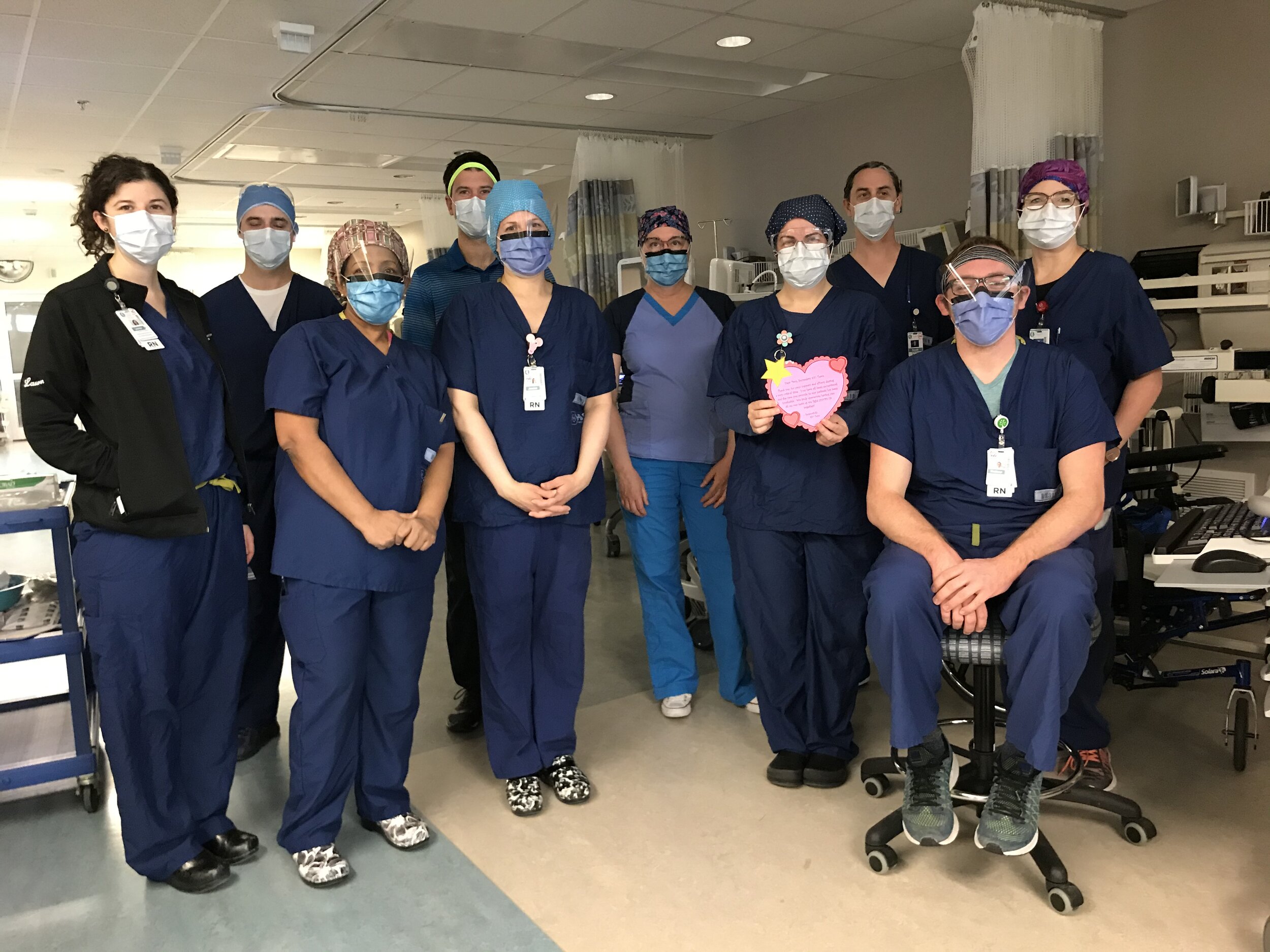Situation Critical: PACU Responds and Becomes our ICU Surge
ICU patients in PACU is not new. Our surge protocol ensures that when there are more ICU patients than beds, PACU provides a safe space for care. Typically, these patients are cared for by the ICU team with support from the PACU team.
COVID challenged new thinking in caring for the critical care patients. It was determined that PACU would take the surge of non-COVID critical care patients and ICU would manage the COVID positive critical care patients. Sounds simple! Yes, PACU nurses are critically trained however their focus is on the post recovery of patients.
“From a PACU lens, not only has the staff been asked to change their clinical focus, they’ve had their environment change as well. They’ve gone from a recovery room to both a recovery room and an ICU,” says Susan Coates, PACU Clinical Manager.
PACU is first and foremost a recovery room, staffed by critical care nurses. They care for patients who have just come out of surgery, manage the effects of anesthesia, and educate their patients and the families on post-surgical care. They are the friendly face a patient sees when they first wake up; the person who treats post-op symptoms and comforts the patients who wake up a little disoriented or scared after surgery. Their environment is fast-paced, and the PACU nurse is trained to make crucial decisions quickly.
ICU is a different ballgame, even for these critical care nurses. The patients who end up in ICU are critically ill, unstable, unconscious and require a very specific kind of care. While the patients who are brought to PACU from ICU are considered more stable, they are still an admitted ICU patient and quite unwell. The PACU team was challenged to enhance and update their knowledge and skills specific to the ICU patient.
“In the beginning, the nurses were concerned about meeting the needs of the patient specific to ICU,” Susan begins. “But we had a lot of support: Nursing Professional Practice provided 24 hour a day bedside support; Renée Chauvin a Critical Care leader working in Organizational Development, arranged and taught a critical care course to support the learning needs of the PACU nurses.” To the changes in care focus, PACU does not have clinical electronic documentation, which was another huge hurdle they had to face. “Clinical Informatics provided them with education for online documentation and continued support for that particular skill.” Remarkable when you realize the technology, they were required to learn in just a few short weeks compared to the rest of the hospital who have been utilizing electronic documentation for a few years. “A lot of people benefited from all these resources. We can’t speak highly enough of the ICU nurses who came to PACU to work collaboratively alongside the PACU nurses in delivering excellent care for our critical care patients.”
When asked about their first day as a surge unit, Susan laughed. “Oh, that is a day I will never forget. It was stressful and emotional for everyone, especially in the first week. We identified and resolved gaps in our resources, equipment, supplies and processes that were required to manage the care of an ICU patient in the PACU environment. As these things started to align the staff rose to the challenge of what they were being asked to do.”
That first week is very different compared to how things are running a month later. “The staff have everything under control and the care of the patients has continued to be the focus. Before the nurses were still figuring out how to document on the computer and were nervous working outside of their speciality. Now, they can manage it all quite skillfully.
This situation has provided the staff with the opportunity to enhance their critical care skills, something that excited quite a few of them. “I had a nurse call me and share how she was pleased that she was able to effectively manage a ventilated patient with a tracheostomy independently.” She was quite proud of herself – and rightfully so! This was something she hadn’t done in 15 years. She is a confident and well-respected nurse who takes great pride in the care she provides to her patients. It was nice to hear that gratification in her voice, that she was able to tackle that skill and feel comfortable that she had carried it out in a professional and safe manner.”
So, how have the staff been during this transition? “They’ve been great – flexible, and very willing to learn. They’ve really put themselves out there in this unprecedented time. It speaks volumes to the commitment of the entire team,” Susan says. It’s inspiring, seeing the strides the team has made in their critical skills. “They’ve definitely recognized the expanded knowledge gained and their ability to be versatile in caring competently for any critical care patient.”
When asked for any last words, Susan immediately lights up when she says this about her unit: “I couldn’t be prouder of the whole team. It hasn’t been easy, but they have risen to the occasion. They have come together as a team and demonstrated their professionalism and resilience in placing our QCH patients first.”

